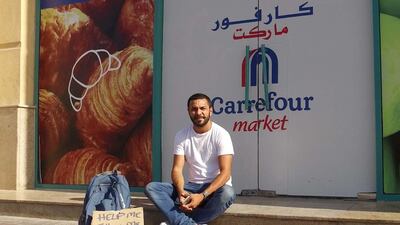Anyone who has heard about Asri Bendacha's first documentary, Follow Me, landing on Netflix has just one question for him: How did you get on Netflix?" reveals Bendacha, laughing.
But that's a story the 35-year-old French-Algerian filmmaker isn't about to tell just yet. He's saving it for his follow-up project, which he is already working on, titled Who Wants to Be a Bitcoin Millionaire.
It might seem a leap from Follow Me's premise, which sees a broke Bendacha in search of Instagram followers, and a greater understanding of social media in general. But it's really not, he says.
"Trying to be an influencer, at the end of the day, is trying to make money," he explains. "We are all in the world trying to make money."
Bendacha, who shot Follow Me by himself, has no formal training in film or documentaries, but has become the first independent documentary filmmaker from Dubai to be featured on Netflix.
Growing up in Paris, he hated school and was kicked out at 16. He swindled his way into an internship at a rock radio station, submitting a phony application that said he needed it for school. "I pretended," he says. "Later on, they told me they knew it was a fake one and that's why they accepted me."
Bendacha worked his way up to morning show producer before setting out for Dubai six years ago, with the goal of launching a music awards programme that would be broadcast on television around the world. “I had big dreams,” he says.
"I had a lot of ambition…obviously I failed." He decided to tackle the subject of Instagram followers after reading Ben Flanagan's September 2016 story in The National, titled $5,000 a post: the power of the UAE's social media influencers. Written in the days before anyone needed licences to earn money from social media, Flanagan spoke to agencies and influencers – including Max Stanton, aka Max of Arabia, who appears in Bendacha's film – about remuneration for what was then still a rising local phenomenon.
The filmmaker started shooting a month later, working on his feature throughout 2017 and into last year. Along the way, he interviewed 400 people, shot 12 terabytes worth of footage, got a cease-and-desist letter from Instagram ("they are mad at me for everything I did", he says) and travelled to California, where he was escorted off Facebook's property in Silicon Valley by a kind security guard.
Among more than a dozen influencers he spoke to, were Jeddah's Lama Al Akeel (427k), 23-year-old Dubai resident Syrian YouTuber Hayla Ghazal (6.1 million) and Emirati chef Bader Najeeb (92.9k).
All were willing to speak about why they loved being on social media, taking selfies, going to events and collaborating with brands. One thing they also had in common? An aversion to the term “influencer”.
After waiting for five hours at a book signing, Bendacha also managed an on-the-spot interview with the American DJ and record producer DJ Khaled, "the king of Snapchat", who also has nine million followers on Instagram. When he heard about Bendacha's quest for followers, Khaled did a surprise on-camera shout out to his fans, although it didn't lead to the dramatic boost in numbers one might think. "There was one who messaged me," Bendacha says.
And even though he has a film on Netflix and has picked up a few influencing deals of his own along the way – you'll learn about that in his next film, too – the filmmaker is far from rolling in the American streaming giant's cash.
“I’m more broke than I was before,” he admits. “The payment schedule is a bit complicated, and during that time, I didn’t work.”
Bendacha didn’t tell his family his film was going to be on Netflix until he confirmed for himself that it was indeed streaming on the site back in November.
In the weeks since the film was released, he has been receiving multiple daily messages from people all over the world. "What I like about it is [that] most of the people like texting me while they are watching the film," he says. "The interaction is between me and them while they are watching the show."
More than two years after starting out, Bendacha has got an influencer-sized stable of his own now, at 15,000 people. Yet although the film interviews a number of experts and puts forth various strategies and theories about how to get more followers, there is only one way Bendacha can personally recommend: by making a documentary about it.
The biggest jump came, he says, when he started screening the film. “I realised very quickly the reaction from 20 to 30 per cent of the audience,” he says, “was to check Instagram and follow me.”
After speaking to so many people on the subject, he has concluded that the only true influencers are people who have real fans and general name recognition – Rihanna and DJ Khaled, for example.
______________________
Read more:
Sami Yusuf: 'If one has a strong spiritual discipline, it lessens the burden'
A Dubai influencer had her Instagram account shut down and this is the video she thinks caused it
______________________
All the rest with followers are “online celebrities”, says Bendacha, even “human billboards”, as someone calls them in the film. If you don’t follow them, you don’t know about them. And if you stop following them, they “disappear from your life”, he says.
The term “influencer” has taken on an even more negative connotation in the years since Bendacha set out to make his film, with reports of extensive demands, outsized fee requests and even bigger attitudes.
But he doesn’t blame the influencers.
“If you give credit to someone and you give them so much attention and five-star hotels and business class tickets, you feed their ego,” he says.

